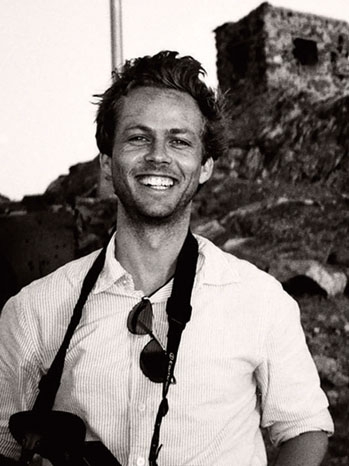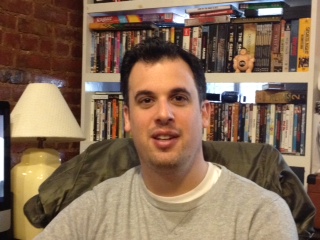|
|
||
|
Pro Tools
FILMFESTIVALS | 24/7 world wide coverageWelcome ! Enjoy the best of both worlds: Film & Festival News, exploring the best of the film festivals community. Launched in 1995, relentlessly connecting films to festivals, documenting and promoting festivals worldwide. We are currently working actively to upgrade this platform, sorry for the inconvenience. For collaboration, editorial contributions, or publicity, please send us an email here. User login |
Metropia Director Tarik Saleh talks with Fest 21 about 9/11, why he set Metropia in Europe, and Paris Hilton…
FEST21 (Suzanne Lynch): You said at the press conference, "(Metropia) is about those years when the world went insane, it's about the past. And when you are afraid, you do irrational things." But Metropia is set in 2024... so to what degree is it about the past? TARIK SALEH: When 9/11 happened... I think that, in Europe, for example, we have a tradition of criticizing the United States, almost on a reflex basis. It doesn't matter what the United States does or how it reacts to something, it's an overreaction - we always think it's an overreaction in Europe, you know? It's a luxury we have because the United States is the most powerful...at least for a little while more until China takes over maybe...country in the world. The metaphor would be parent/child almost - yeah, you criticize your parents, you feel like they are wrong, they're always wrong, ugh, overreaction, c'mon, let me do whatever I want to, type of reaction. Well, 9/11 changed this. This perception of the United States as sort of a parent was just blown away. This idea of the most powerful nation just crumbling in front of your eyes was devastating in a way. I remember sitting and watching...and I was very critical of a lot of things the United States has done with their foreign policies before, but when those planes hit at 9/11, I remember thinking... "Whoever is behind this can't be better." The first ten hours (after the planes hit) the feeling was ‘this is someone who is more on top of what they're doing than the US military is.' That feeling was very scary to me. I remember. It's almost like the first time I realized my Dad was wrong. I had protested a lot of times, but when I really knew that he didn't know what he was talking about, I realized, I'm alone. I'm alone now, I have to take my own decisions now and it was really scary. It didn't help that the President at that time was one of the most stupid presidents ever...we knew that from things he's said before...and the people that surrounded him, well they weren't stupid, but they were very sinister. FEST21: Why not set Metropia in the US then? TS: Metropia is set in Europe. Europeans pride themselves on being civilized, I would say that Europeans have done horrific things historically-- it's a very dark past. They were Europeans who came to America and killed the people that lived here and founded this country. It was Europeans who formed Nazism and tried to kill the Jewish population in Europe. It was also Europeans who took over big portions of the world - Africa, India - and enslaved huge parts of the population. This is all history. Today--with that past--there's a lot of fantastic things. Because obviously Europe and America, we are leaving in the height of a civilization that has fantastic things in it. But it was very obvious to me...I travelled a lot the years after 9/11 when I was doing Gitmo, the Guantanamo documentary, and...it was always more difficult for me to come back to Europe. I mean.. I got interrogated sometimes here (in the US), especially when I came into New York. I mean, my name is Tarik and one of the hijackers name is Tarik so I wasn't that surprised. But people were always very friendly. There was no... But when I came back to Europe - it's not that gentle. That's why with Metropia, I didn't want to set it in the United States. I wanted to say, Yeah OK, we have this past with Hitler and Stalin and all these kinds of leaders. In Europe we always say "Never Again," that's a cliché that people repeat constantly, Never Again, when they talk about Nazism and the Holocost. Well, what's stupid with that statement is that, yeah, it will never happen again like THAT. It will happen in a new way. It will come in a new form. Fascism will come dressed uplike something else. Like in Metropia, where a corporation has basically taken over the continent. The way it happened in Metropia is that politicians failed, there was no functioning infra-structure, a business man takes over the metro networks and he gets unlimited power. In the film that results in two things. The first thing is that he starts to cross lots of boundaries in terms of the integrity of the citizens. He starts to listen to the thoughts of the people and produce thoughts that he thinks will be good for him. But it also creates something else -- that other people who want power, well, they want to get him.
...One of the people I looked at for (the character of Nina) was Paris Hilton. Because this is the future of the power elite -- where your name is a brand and you pretend that you don't have a clue about anything -- and being popular, just being popular, is power. So for me Metropia is almost about the past, because I think we've moved beyond that point. I am very optimistic about the future. It's about commenting on a time that we lived through... In Europe, we are very affected by who is leading this country (the US). During those years with Bush... the message was, you can be the most powerful person in the world without being intelligent... Now I think it's the Return of The Nerds...I think it's good...I think we are going into a time of education and knowledge and science. -- Suzanne Lynch
29.04.2010 | Tribeca Film Festival's blog Cat. : 9 Africa Album America Bush business man Cinema of Sweden Director Europe film Film Hitler India Metropia New York Paris Hilton Person Career president Stalin Suzanne Lynch Tarik Saleh TARIK SALEH United States Yeah PEOPLE
|
LinksThe Bulletin Board > The Bulletin Board Blog Following News Interview with EFM (Berlin) Director
Interview with IFTA Chairman (AFM)
Interview with Cannes Marche du Film Director
Filmfestivals.com dailies live coverage from > Live from India
Useful links for the indies: > Big files transfer
+ SUBSCRIBE to the weekly Newsletter DealsUser imagesAbout Tribeca Film Festival Online Dailies Coverage of the Tribeca Film Festival, April 17-28, 2013
The Tribeca Film Festival brings together local, national, and international talent to provide the New York City, downtown community with five days of screenings, educational workshops, and various special events.
View my profile Send me a message My festivalThe EditorUser links |





























